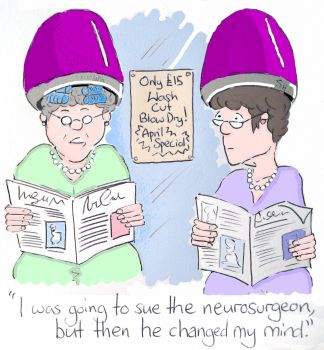Book helps medical students to keep patients in mind
By: Alison Field
Last updated: Monday, 14 March 2011

Cartoon by Simon Hall from Psychology for Medicine by Susan Ayers and Richard de Visser
Why does the rate of heart attacks increase during the World Cup football finals? How do you break bad news to a cancer patient? How can you help an obese patient to lose weight?
These are just some of the topics covered in a groundbreaking new book by University of Sussex academics, which is helping student doctors to consider the importance of psychological factors in medical practice.
Psychology for Medicine is the first textbook of its kind, providing medical trainees and new doctors with all the relevant psychological knowledge they need in one volume. Previously, students had to refer to many different books for the relevant psychology.
The book, by Sussex psychologists Dr Susan Ayers and Dr Richard de Visser, has been well received by fellow academics and medical practitioners and was compiled with help from the students and staff of the Brighton and Sussex Medical School (BSMS).
The students proofread the chapters, provided ideas for the content, carried out the admin work and even modelled for the photographs. The book provides a solid grounding in psychological study relevant to medicine, along with case studies and practical tips and advice for practice. One student, Simon Hall, drew cartoons for the book.
The study of psychology is important for doctors for a number of reasons. Psychological and physical symptoms are highly related. Up to a third of the patients seen by GPs will have psychological disorders, while physical causes are usually found for only around 15 per cent of people's symptoms. In treatment, a lot of the effect of drugs can be due to patients believing they will recover rather than the drug itself.
The importance of doctors having a sound understanding of psychological issues in health was highlighted in a recent General Medical Council report, Tomorrow's Doctors, which emphasised the need for more psychological and social sciences learning in medical training.
Dr Ayers says: "We were inundated with offers of help from the students. We were amazed at their enthusiasm and how generous they were with their time.
"The important thing about this book is that it is applied science - it shows why psychology is important to medicine and how we would use it.
"Promoting healthy lifestyles is an important aspect of medicine and has the potential to save thousands of lives. It's also vital to understand that people respond differently to illness so it's important for doctors not to assume they know how the patient feels."
Dr de Visser says: "The book's presentation is really important. It's not just lots of theory, but full of tips and advice so that students can take what they learn in the classroom and apply it to real-life situations."

